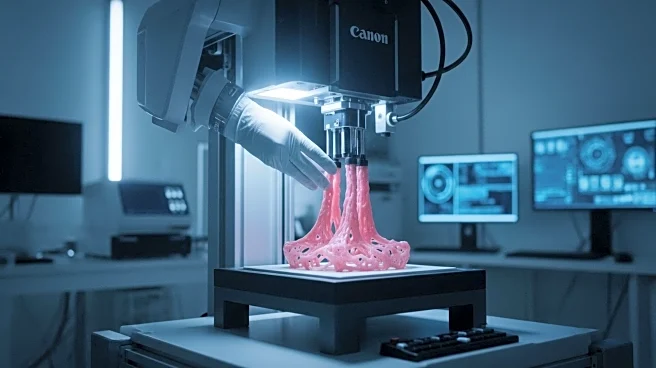What's Happening?
A significant advancement in regenerative medicine has been achieved by researchers at UMC Utrecht and Utrecht University, who have developed a novel volumetric bioprinting technology named GRACE. This technology integrates artificial intelligence and advanced imaging to construct living tissues rapidly while adapting in real time. The GRACE system addresses challenges in tissue engineering, such as enhancing cell survival and function within printed constructs. Unlike traditional bioprinting, which involves layer-by-layer deposition of cells, GRACE uses light to solidify a photosensitive gel infused with cells in a single step, reducing exposure time and mechanical stress. This innovation allows for high-resolution visualization of cells during printing, enabling dynamic co-design of tissue structures.
Why It's Important?
The development of GRACE represents a transformative leap in bioprinting technology, with potential implications for tissue repair, drug testing, and organ replacement. By improving cell viability and function, GRACE could significantly advance the field of regenerative medicine, addressing the global shortage of organ donors. The integration of AI-driven imaging and adaptive design processes enhances the precision and reproducibility of bioprinted tissues, paving the way for personalized medicine. This technology could democratize access to advanced bioprinting methods, fostering innovation and collaboration among research groups worldwide.
What's Next?
The research team, led by Riccardo Levato, plans to expand GRACE's capabilities to print complex tissues like heart and liver, which require intricate vascular networks. They aim to make the technology accessible to other research groups, promoting an ecosystem of innovation in adaptive volumetric bioprinting. Further biological investigation is needed to ensure the maturation of printed cells to achieve full native tissue functionality. As GRACE technology evolves, it may redefine approaches to repairing and replacing human tissues, bringing personalized medicine closer to reality.
Beyond the Headlines
GRACE's development highlights the growing convergence of artificial intelligence and biofabrication, where machines not only execute but also understand and adapt to biological complexity. This intelligent manufacturing platform could redefine tissue engineering, offering a glimpse into a future where living tissues are fabricated on demand with the sophistication found in nature. The technology's ability to dynamically adapt to cellular arrangements and integrate vascular networks in real time marks a paradigm shift in bioprinting, potentially alleviating the global shortage of organ donors.











